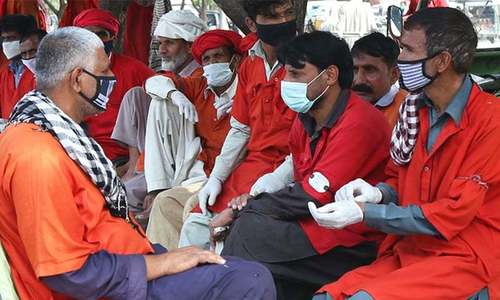Sindh is tapping Rs1.3 billion special emergency funds. It has raised another Rs1.7bn from salary deductions of provincial government employees for a special coronavirus grant of Rs3bn to deal with the health emergency.
The provincial government has released Rs12.2bn as regular and special grants to finance the virus control–related activities until March 26, according to the finance department. The heads from which these funds have been diverted are shown in the table.
A member of the chief minister’s team shared his concerns about the paucity of funds, saying he the provincial budget has already gone haywire.
“Spending needs have multiplied while the resource inflows have shrunk on account of a drastic economic slowdown. The prospects of higher federal transfers are bleak as the resource crunch is not limited to this province alone.”
Investing in health facilities has taken precedence over all other considerations to fight Covid-19
According to another member of the chief minister’s team, the government has blocked all recurring spending except pension and salaries, which have been chopped for the current month. “We might divert the leftover development budget. We are also looking at starting a donation drive by first fixing a credible, transparent structure with the participation of philanthropic entities and volunteers to stem the chances of wastage/misuse of funds. The operative systems of NGOs will be used for the disbursal of relief in cash or kind,” he said.
“The available resources are still nowhere close to what Sindh needs. Monthly federal transfers over the past eight months of 2019-20 have been almost half of what was pledged.
“There is already a shortfall of Rs176bn in receivables from the federal government. Besides, no one expects a spike in the provincial tax collection. The picture, therefore, is dismal,” a source in the finance department said.
Talking about the ongoing policy discussion, a provincial secretary tells Dawn investing in health facilities has taken precedence over any other consideration at the moment. “We had to prioritise and we did,” he said. For relief, we intend to launch a donation drive besides paltry government funds,” he explained.
Commenting on the stocks of essential food items in the province and the possible fallout of supply chain disruptions, relevant officers admit that the government does not have a clear picture.

“Sindh maintains 1.3 million tonne emergency stocks of wheat. We hope and pray that God will be kind and we will come out of the current crisis stronger. We have no idea about the actual demand and supply situation of other essentials such as rice, sugar, edible oil, greens etc,” commented an officer concerned.
“I heard a lot of talk on monitoring and tracking the provincial economy in policy circles. But as far as I know, work has yet to start. Geographical mapping comes later. We lack basic data,” he said.
In response to Dawn’s query on budgeting for Covid-19, Sindh Chief Minister Syed Murad Ali Shah said, “The government is fully aware of the scale and magnitude of the coronavirus pandemic. Despite meagre resources, we are doing all we can. We are focusing efforts on all aspects of the challenge, including preventing the further spread of the virus, adopting adequate precautionary measures, curing affected people and providing subsistence to those who are economically hurt by the current lockdown.”
The situation may still be fluid, but the Sindh government’s performance has stunned critics. It has proven itself to be the most dynamic and caring of all the other governments in Pakistan by acting promptly, heeding the World Health Organisation guidelines, adopting health protocols and implementing the required measures.
“I am pleasantly surprised. They did set the path for others to follow for containing the spread of the deadly virus,” said a businessman who is known to publicly vilify the PPP leadership.
“Yes, we have taken baby steps, but the test has just started. The catastrophe continues to stare in our face. We know that corona cases can spike beyond the capacity of the health infrastructure in Sindh any time. We might have to extend the lockdown.
“In the absence of structured, reliable data of the provincial economy, how will we sustain? We have doubts about the assumptions that we are basing our planning on,” an active member of the chief minister’s team said.
To prove his point, he mentioned the current Labour Survey projection of 2.4m daily-wage workers in Pakistan of which 1.5m are in Sindh. “If you believe the official survey, barely 1pc of Pakistanis are daily-wage earners. Stop kidding me. I can bet there are more than 2.4m daily-wage earners in Karachi alone — a city of over 20m. I wonder what purpose such flawed data serves?” he said.
It is not clear if the busy provincial leadership repents not empowering local governments that could have shared the burden and helped improve the quality of decisions and their implementation.
Published in Dawn, The Business and Finance Weekly, March 30th, 2020
















































